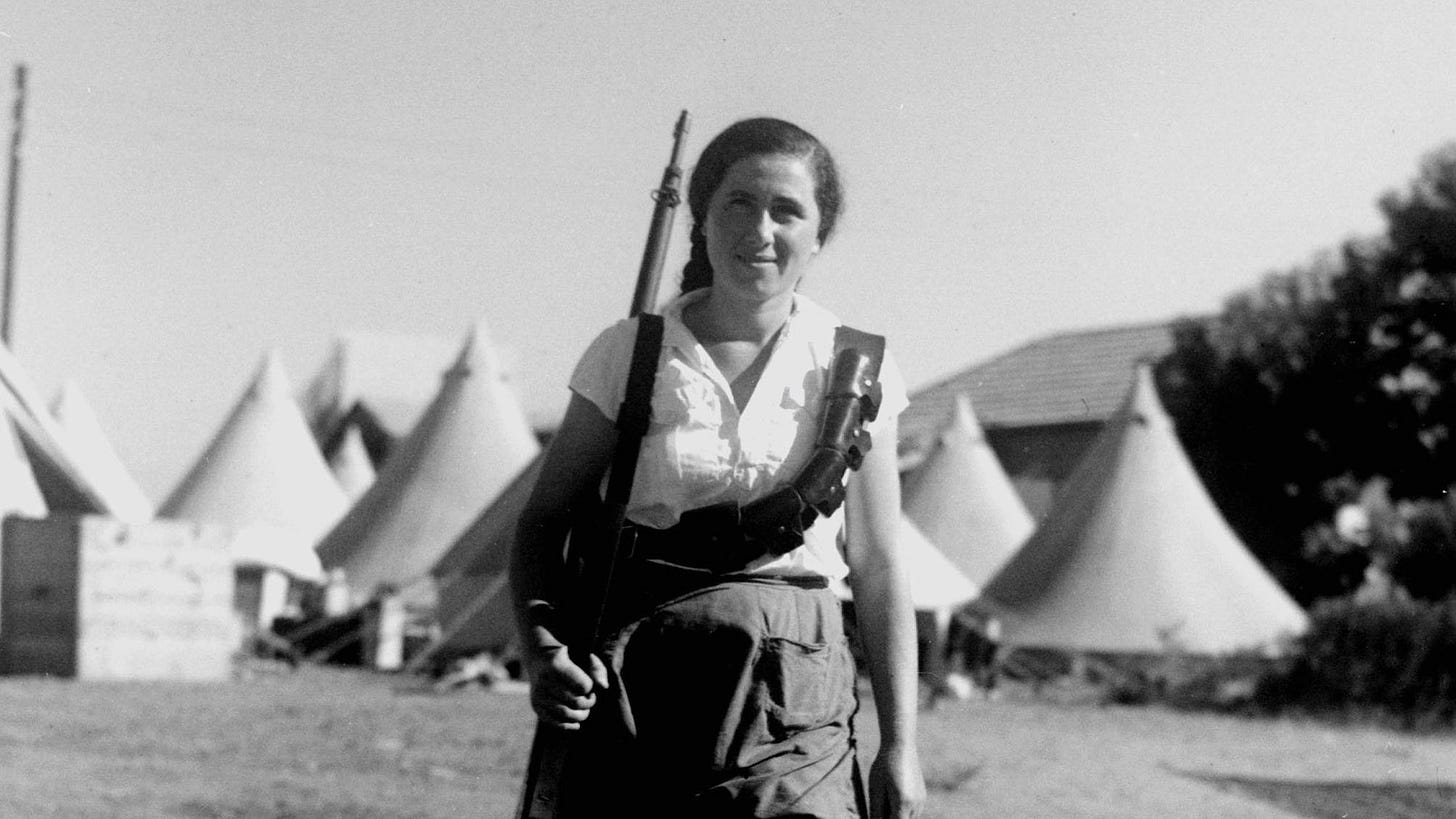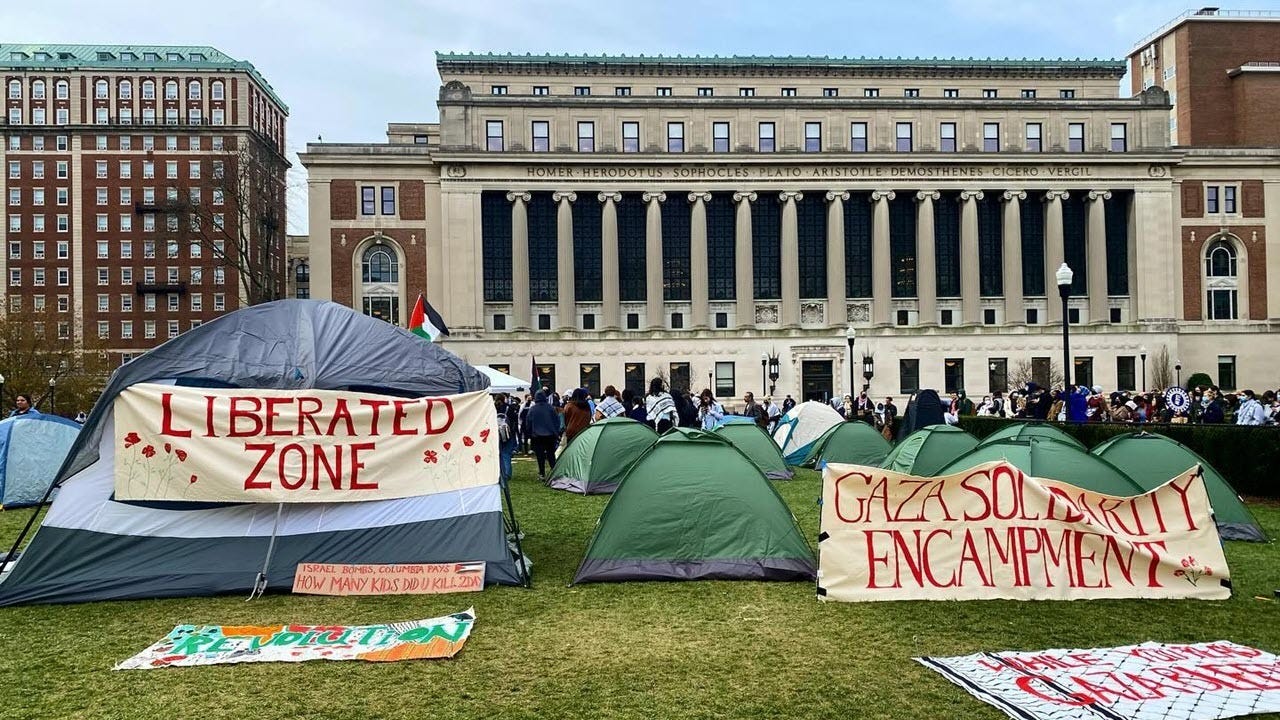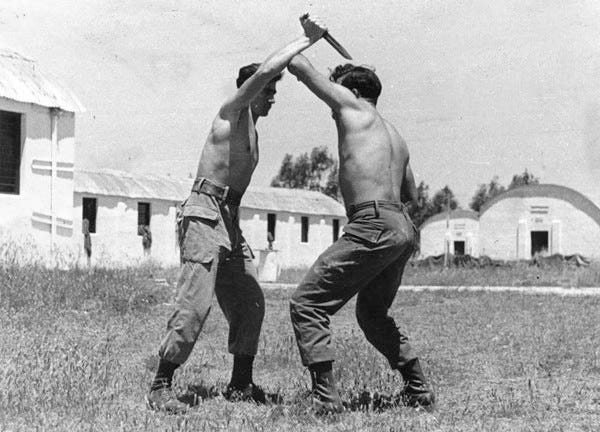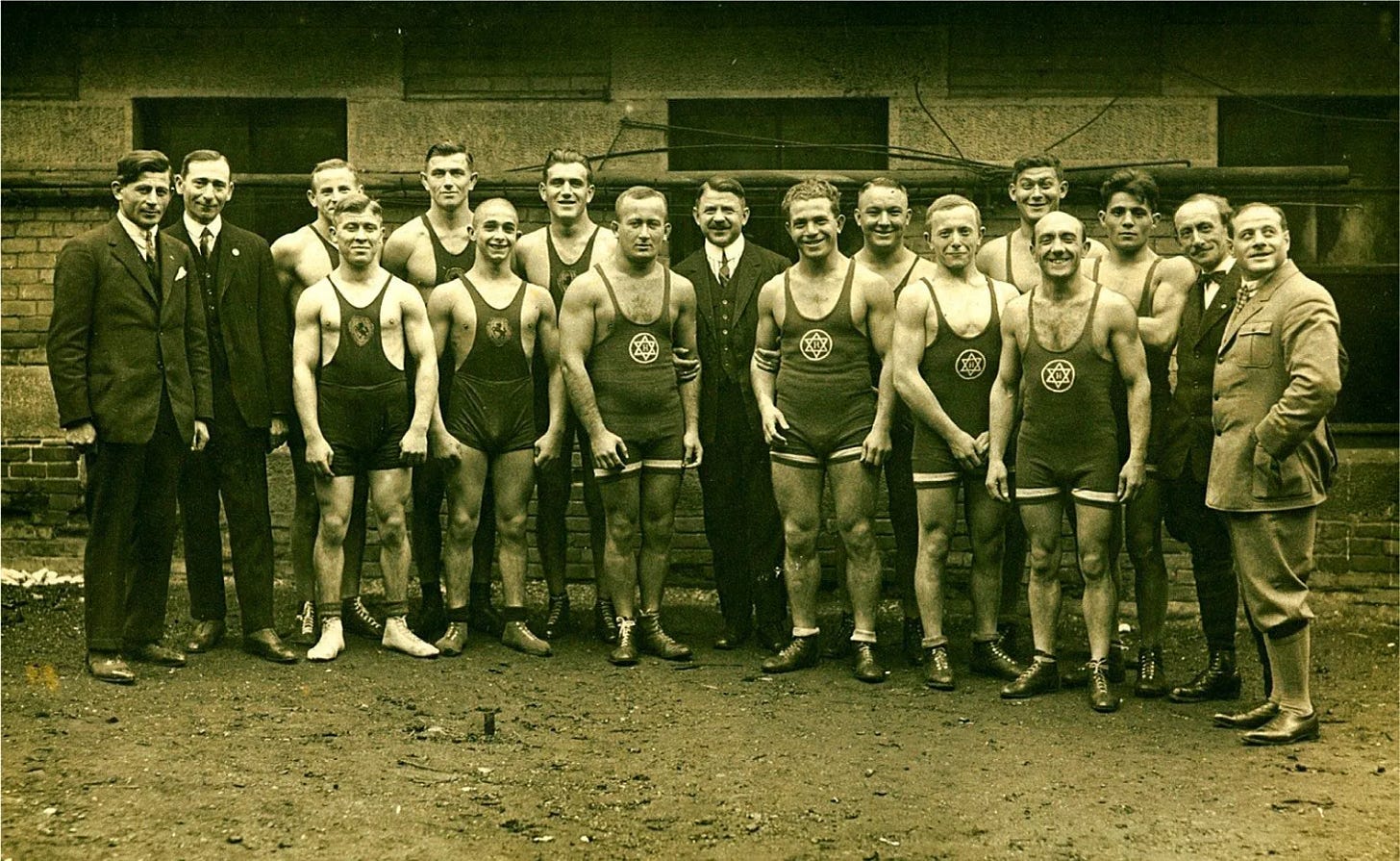How to (Actually) Fight Antisemitism on College Campuses
Yes, I know, everyone in the fight against antisemitism and "anti-Zionism" has been acting with the best of intentions, but let’s stop being so soft — and let’s start confronting unfortunate truths.
Please consider supporting our mission to help everyone better understand and become smarter about the Jewish world. A gift of any amount helps keep our platform free of advertising and accessible to all.
You can also listen to the podcast version of this essay on Apple Podcasts, Google Podcasts, and Spotify.
Antisemitism or “anti-Zionism” — or whatever you want to call it — on college campuses is back in the “front page” news this week, especially in the U.S. (but not only).
For those in the crowd who have been paying attention during the last few decades, this is nothing new. People have been warning us about it for awhile now. In 2019, esteemed writer Liel Liebowitz (who was schooled at Columbia University) wrote a piece which argued that colleges were beyond redemption and that Jews should not apply anymore.
“Sadly, it aged very well,” he added this week.1
Some Jewish organizations, such as Hillel and the Anti-Defamation League, have been investing significant resources to “fight antisemitism” on college campuses. While their efforts and others have been with the best of intentions, it is about time we stop being so soft — and start confronting the unfortunate truth:
The overall response to fighting antisemitism and “anti-Zionism” on college campuses (and in other public arenas) has been profoundly ineffective.
Heck, I could easily make the argument that the overall response to fighting antisemitism and “anti-Zionism” on college campuses (and in other public arenas) has actually made these realities worse.
But I am not just here to hand out jabs and insults, so I have pondered some more-outside-the-box approaches that Jews across the world can use to diminish antisemitism and “anti-Zionism” in every public venue. Here we go:
1. You fight by fighting back.
I want to preface this section by saying that, in general, I am anti-violence. If there is a genuine opportunity to engage civilly and diplomatically, I am all for it.
But most antisemites are not so keen on civility and diplomacy, preferring to spew dangerous propaganda and other ridiculous rhetoric as their voices grow obnoxiously louder.
The one thing about these antisemites, though, is that many of them shy away from direct physical aggression against Jews. Even among those who appear to threaten physical aggression, many are just posing as “tough stuff.”
Usually, physical aggression tends to be escalatory, but in the case of antisemitism and “anti-Zionism,” physical aggression (as a means of self-defense) has a good chance of being deescalatory, since many antisemites do not expect it from Jews — and will fold their cards accordingly.
In addition, standing up to antisemitism and “anti-Zionism” with physical aggression (again, in self-defense) will put others who think about displaying their Jew hate on notice: Maybe the “powers that be” (e.g. university administrators, police) will not do anything to you, but we (the Jews) will.
To effectively fight back with physical aggression, Jews will be tasked with learning how to fight. Krav Maga seems like a nice place to start, although any form of combat will suffice.
It is also important to note that today’s Jews would not be the first to fight back. In some 100 ghettos across Eastern Europe during Nazi Germany’s reign, underground organizations were formed to wage armed struggle. In several concentration camps, Jewish forced-labor workers initiated uprisings. And following the Holocaust, some Jews even hunted Nazis who were still alive.
The point is, if we do not stand up for ourselves, or if we “back down” and, even worse, demonstrate fear in the faces of antisemites, we are emboldening antisemites to do what they obnoxiously do, and more of it.
2. Muscular Judaism
Max Nordau, a Zionist leader and physician who was born in 1849 in Hungary, perceived the characteristics of 19th-century European Jews to be problematic in dealing with antisemitism (which at the time was a million times worse than its present-day forms).
According to Nordau, 19th-century European Jews were often the rabbinic or Haskalah Jews — the Jews of letters, intellectuals — who were said to be busy all their life engaging with esoteric subjects. Nordau believed their bodies grew weak, which is why he saw the promotion of athletic Jews (what he called “Muscular Judaism”) to be a profound prescription against antisemitism.
“Muscular Judaism” refers to the cultivation of mental and physical properties, such as strength, agility, and discipline, which Nordau believed were all necessary for the Jewish People’s national revival.
Advocating for a transformation to “deep-chested, sturdy, sharp-eyed” Jews that would vanquish negative perceptions of them, Nordau argued that mental and physical strength would be an imposing response to “Jewish distress” in antisemitism-infested Europe.
Over time, Jews who went on to adopt “Muscular Judaism” experienced an increase in self-confidence, a critical ingredient in the Jewish fight against antisemitism.
3. Jewish Bodyguards
In 1909, two Austrian Zionists and prominent Jewish businessmen founded the first Jewish sports club and named it Hakoach (הכח), meaning “the strength” or “the power” in Hebrew.
At the time, Jews in Vienna numbered 180,000 — about 10 percent of the city’s population — and many of them were intoxicated with the aforementioned doctrine of “Muscular Judaism.”
David Herbst, the sports club’s president from 1928 to 1938, echoed this sentiment, saying:
“In the days of our forefathers, we Jews have completely forgotten the old and true words in the education of our children: Mens sana in corpore sano! We only thought that the new generation should be educated. We neglected what today the whole world recognizes as the only proper educational principle: to make our bodies strong.”2
During its first year, the Jewish sports club’s members competed in fencing, field hockey, track and field, wrestling, swimming, and football — eventually expanding its roster to other athletics and attracting Jewish athletes from across Europe.
Their football team was one of the first to market itself globally through frequent travel, attracting thousands of Jewish fans in London and New York, as well as in South America, Africa, and other cities throughout the United States. They also garnered the attention of prominent Jewish figures, such as the author Franz Kafka.
After touring Germany in the early 1920s, a prominent newspaper commented that the club “had helped to do away with the fairy tale about the physical inferiority of Jews.”
However, the football team regularly faced antisemitism during its travels, so they created an unconventional form of security: The sports club’s wrestlers accompanied them, acting as their personal bodyguards.
What if, when Jews demonstrate on college campuses and in other public venues, they are joined by Jewish bodyguards — Jews who are physically fit and poised to fend off rowdy antisemites?
4. The ‘New Jew’ Mentality
Many young Jews seem to lack resilience nowadays, a trend heightened by environments which over-emphasize “safe spaces” — only making them less resilient, or what I will call “fragile Jews.”
The fragile Jew reminds me of, albeit under different circumstances, many Jews before the State of Israel, who displayed an older Jewish pattern of relying on powerful non-Jewish guardians, whose ongoing protection had to be secured through techniques such as politics and business.
But the State of Israel, founded in 1948, transformed an extraordinary amount of Jews. It made these Jews more confident, more ferocious, more daring, more adventurous, more optimistic, more heroic, more glorious.
And it led to a conception of the “New Jew” whose “soul and character would be purged of the disfigurements impressed upon the Diaspora Jew by millennia of exile,” according to Eli Spitzer, headmaster of a Hasidic boys’ school in London.3
“Each Zionist thinker differed in identifying which aspects of the Old Jew were particularly objectionable, and thus which aspects of the New Jew were most crucial to inculcate,” Spitzer added, “but all agreed that something had gone drastically wrong in Jewish history which went far beyond the persecution that Jews had suffered at Gentile hands.”
Here is an interesting way to understand the difference between Old Jews and New Jews:
The State of Israel makes a formal announcement, warning that it is dangerous for Jews to travel to Turkey for the foreseeable future. The Old Jew heeds Israel’s warning and stays far away from Turkey, while the New Jew (typically the Israeli Jew) responds with something like, “C’mon now, there’s no reason to be afraid. I was in the army. My cousin is in the Mossad. Everything will be okay. When is the next flight to Istanbul?”
All humor aside, the Old Jew is still very much present, especially in places like the United States, Canada, Europe, Australia, and South Africa. And many Old Jews run thousands of Jewish organizations, financed with billions of dollars by Old Jew philanthropists. In other words, these organizations, which are meant to serve all Jews and Jewish communities, only propagate more Old Jew attitudes and paradigms like victimhood, anxiety, and fear.
The result? Many of today’s young Jews are more insecure, more easily offended, and more reliant on others. They have been taught to seek authority figures to solve their problems and shield them from discomfort, a condition sociologists call “moral dependency.”
To be sure, our elders have had the best of intentions, but efforts to protect younger Jews are backfiring. When we raise Jewish kids unaccustomed to facing anything on their own — including antisemitism — the Jewish People are threatened.
Perhaps an Old Jew can never fully become a New Jew — and I am not sure they need to. I actually believe that the “muscular” Jew and the so-called rabbinic Jew are not mutually exclusive. Nowadays, I think they make for a complete Jew: one who is both intellectually driven and physically and mentally fit.

5. Israel as the Epicenter
Naturally, it is easy for Jews to be proud, forthright, brash, optimistic, and confident when you live in a Jewish country, amongst a Jewish majority. But that is exactly the point: The State of Israel is the most effective way to abate antisemitism.
Quite literally, the Mossad has departments whose job is to look after Jews across the world, even if these Jews do not live in Israel, and even if they are not Israeli citizens. What does the Mossad do exactly? It works with other intelligence agencies to monitor and thwart antisemitic attacks across the world, which you almost never hear about because the very nature of intelligence is to operate covertly.
Yet more and more Jews across the world are becoming increasingly picky and choosy about their relationship with Israel (or lack thereof). To me, a Jew who does not support the State of Israel (i.e. the Jewish homeland) is just as dangerous as a person who is antisemitic. (Notice how I wrote “the State of Israel” and not “the government of Israel” or “the politicians of Israel.”)
Diaspora Jews ought to be continuously improving and enhancing their relationship with Israel, and Israel ought to be doing the same with them. It is a two-way street, and the more that Diaspora Jews engage with Israel, the more Israel (both the State and everyday Israelis) will engage with them.
I get it, though, visiting Israel on a regular basis is not always convenient and affordable. Still, there are several other ways to engage with Israel on a day-to-day basis, such as a watching Israeli movies and TV shows; following Israeli social media accounts, thought leaders, and influencers; learning modern-day Hebrew; eating at Israeli restaurants in major cities across the world; and volunteering with organizations which deploy Israelis across the world, such as the Jewish Agency for Israel.
The point is, the Diaspora-Israel relationship is essential, because the stronger and more unified that Israeli and Diaspora Jews are, the more antisemitism becomes powerless, and the more the Jewish People of today and of future generations will thrive.
liel leibovitz on X
“Hakoah Vienna.” Wikipedia.
“The End of the New Jew and the Rebirth of the Old.” Mosaic.





I've been pushing for the defunding of every college / university that promotes & teaches Jew hatred. Love this article too! #EnoughIsEnough #EndJewHatred NOW!
Thank you, Josh, for supporting a tough Jew approach. You mentioned the Mossad has departments for helping Jews in the Diaspora. I wasn't aware of this. If you could interview someone from the Mossad with info about it, that would be great! My advice to Jewish readers is this:
1) Take a course in self defense. A good one will show you how to size up and respond to various situations and how to use everyday objects (like keys, canes, even a handbag) as weapons if your jurisdiction won't let you carry a gun. The main thing is not to look like an easy target. Walk tall and proud, even if you use a mobility aid. Attackers size up your body language and often avoid people they think will kick up a fuss.
2) Insist that your Jewish spearhead organization (e.g. the JCC, the Federation) devote more money to security and self defense programs. I have noticed that many of these orgs are making a big splash with feel-good rallies and events when they should be helping Jews in their area to feel safe going out.
3) If there are many anti-Semitic incidents involving physical threats in your area, support the revival of the Jewish Defense League or any Jewish org that patrols public areas and has a hotline for Jews who’ve been physically threatened and can supply identifying information about their attackers. (This also applies to any anti-Semites in your school or workplace who are getting away with discriminating against you and thwarting your ability to make a living or get an education.) G-d forgive me for saying this, but we need a group that uses Mafia-like ways of making these demons quietly “disappear”. Did you know the Mafia started as a way for Italian Americans to get justice against bullies when the police and courts wouldn’t help them? Well, there are too many threats and attacks against Jews that are getting nothing but lip service from the justice system. If they won’t give us justice we must get it for ourselves.
4) Continue supporting Israel but be careful about giving your money to scam-artists. If you don’t recognize the charity, do some research about them before donating. Don’t be taken in by “uplifting” FB stories and memes.
Be smart. Be proud. Am Yisroel Chai!